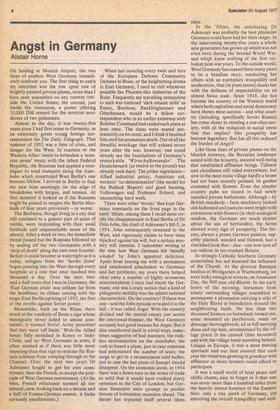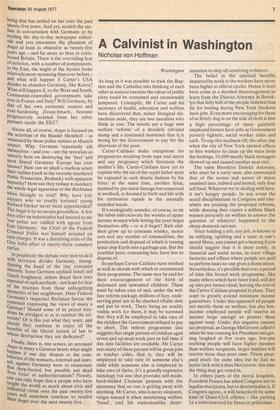Angst in Germany
Alistair Home
On landing at Munich Airport, the two faces of modern West Germany immediately confront you. The first thing to catch my attention was the row upon row of brightly painted private planes, more than I have seen assembled on any runway outside the United States; the second, just inside the concourse, a poster offering 10,000 DM reward for the terrorist murderers of two policemen,
Almost to the day, it was twenty-five years since I had first come to Germany, as an extremely green young foreign correspondent for The Daily Telegraph. That summer of 1952 was a time of crisis, and danger for the West. In reaction to the Western Allies' intent to formulate a 'separate peace' treaty with the infant Federal Republic, the Russians had applied a tourniquet to road transport along the Autobahn which constituted West Berlin's one tenuous lifeline. I arrived in Berlin to find my new boss seemingly on the edge of breakdown with fatigue, and tension. At that moment it looked as if the Russians might be poised to reopen the Berlin blockade of four years previously — or worse.
The Berliners, though living in a city that still consisted to a greater part of acres of rubble, were responding with their usual fortitude and unquenchable sense of the absurd. After a week or two, the immediate threat passed but the Russians followed up by sealing off the two Germanies with a 'strip of death' along the east-west frontier, Before it could become as watertight as it is today, refugees from the 'Soviet Zone' began pouring into the West through every loophole at a rate that once reached two thousand a day. Over the next twoand-ahalf years that I was in Germany, the 'East German crisis' was seldom far from the headlines; its climax coming with the tragic East Berlin uprising of 1953, the first of the revolts against Soviet power.
Meanwhile, back on the Rhine there stood at the outskirts of Bonn a sign whose incongruity never failed to amuse journalists; it warned Soviet Army personnel that they were 'off limits.' With the Allied forces fully stretched in Korea or IndoChina, and no West Germans in arms, it often seemed as if there was little more imposing than that sign to restrain the Russian colossus from romping through to the Channel. Over the next two years Dr Adenauer fought to get his own countrymen, then the French, to accept the principle of West German rearmament. (At the time, French reluctance seemed all too natural; now, looking back on a decade and a half of Franco-German entente, it looks curiously anachronistic.) When not covering every twist and turn of the European Defence Community Debates in Bonn, or the heightening drama in East Germany, I used to visit whenever possible the Phoenix-like industries of the Ruhr. Frequently my travelling companion to such war-battered 'dark satanic mills' as Essen, Bochum, Recklinghausen and Oberhausen, would be a fellow correspondent who in an earlier existence with Bomber Command had raided each place at least once. The dates were seared permanently on his mind, and I think it haunted him until his premature death. Out of all the dreadful wreckage that still existed seven years after the war, however, one could already see the foundations of Germany's remarkable `Wirtschaftswunder'. The Deutschemark (at twelve to the pound) was already rock-hard. The prime ingredients — Allied industrial policy, American aid, workers' co-determination' (the model for the Bullock Report) and good housing, Volkswagen and Professor Erhard, and unremitting hard work.
There were other `stories' that kept Germany constantly on the front page in the early 'fifties; among them I recall most vividly the disappearance to East Berlin of Dr Otto John, the chief of Adenauer's MI-5, in 1954. John subsequently returned to the West, and vigorously claims to have been hijacked against his will, but a certain mystery still remains. I remember writing at the time how West Germans felt `morally winded' by John's apparent defection. Apart from leaving me with a permanent and unashamed attachment to Germany and her problems, my years there helped clear away a number of highly erroneous misconceptions I once had about the Germans; one was a crazy notion that a kind of phlegmatic stolidity was the salient national characteristic. On the contrary! If there was one — and the John episode revealed it to the full — it was called Angst. With the country divided and the mortal enemy just across the interzonal-frontier, the West Germans certainly had good reasons for Angst. But it also manifested itself in trivial ways, sometimes suggestive of bad manners; the ruthless determination on the Autobahn; the rush to board a plane, just in case someone had miscounted the number of seats; the surge to get to a mountainous cold buffet, just in case the last piece of Spargel should disappear. On the economic scene, in 1954 there was a down-turn in the terms of trade so mild that it would have evoked starry optimism in the City of London, but German financiers were prompt to predict threats of bottomless recession ahead. The theme has repeated itself several times
since.
In the 'fifties, the unfaltering Dr Adenauer was probably the best physician Germans could have had for their Angst. In the intervening twenty-five years a whole new generation has grown up which was not even born during the Second World War, and which knew nothing of the first turbulent post-war years. To the outside world, West Germany has ceased these many years to be a headline story, conducting her affairs with an exemplary tranquillity and moderation, that (in press terms) cloaks her with the dullness of respectability on an almost Swiss scale. Since 1945, she has become the country of the Western world where both capitalism and social democracy have shown most success — and what country (including, specifically Soviet Russia) has come closer to creating a one-class society, with all the reduction in social stress that that implies? Her prosperity has become legendary. But has all this reduced the burden of Angst?
Like those lines of private planes on the Munich runways, the Bavarian landscape oozed with the leisurely, assured well-being that established affluence brings. Tidiness and cleanliness still ruled ,everywhere, but now in the most rustic village hardly a house had not been recently painted, its garden crammed with flowers. Even the simpler country pubs we stayed in had newly installed private bathrooms. Although — by British standards — farm machinery looked old-fashioned and pastures were bright with extraneous wild-flowers (in their ecological wisdom, the Germans are much stricter about the use of herbicides), the farms showed every sign of prosperity. The forests, always a prime German passion, superbly planted, weeded and thinned, had a cherished look that — alas one now sees all too seldom in tax-crushed Britain.
In strongly Catholic Southern Germany materialism has not lessened the influence of the Church. At the glorious Baroque basilica of Weingarten in Wurttemberg, we were lucky enough to witness, on Ascension Day, the 900 year old Blutritt. In the early hours of the morning, horsemen from ninety surrounding villages assembled to accompany a procession carrying a relic of the Holy Blood in benediction around the neighbouring fields. No less than two thousand farmers on horseback turned out, some mounted on percherons, some on dressage thoroughbreds, all in full morning dress and top hats, accompanied by the village priest in his cassock (also mounted) and with the village band marching behind. Unique in Europe, it was a most moving spectacle and our host assured that each year the ritual was growing in grandeur with affluence as more farmers could afford to participate.
It was a small world of total peace and idyllic charm, easy to forget in it that one was never more than a hundred miles from the heavily mined frontiers of the Eastern bloc; only a tiny patch of Germany, yet mirroring the overall tranquillity and well
being that has settled on her over the past rwenty-five years. And yet, scratch the surface in conversation with Germans or by reading the day-to-day newspaper editorials and you encounter the phantom of Angst at least as obsessive as twenty-five Years ago — and far more so than in crisisbound Britain. There is the overriding fear of isolation, with a number of components; to the East, the might of the Sqviets looks relatively more menacing than ever before — and what will happen if Carter's USA decides to abandon Germany, like Korea? What will happen if, to the West and South, Communist-controlled governments take over in France and Italy? Will Germany, by dint of her own economic success and ever-hardening Deutschmark, become Progressively isolated from her other Partners inside the EEC?
Above all, of course, Angst is focused on the activities of the Baader Meinhoff — as witnessed by those police notices at Munich airport. Why, Germans repeatedly ask themselves — and you — are the terrorists so unfairly bent on destroying the 'best' and most liberal Germany Europe has ever known? How can so small a nucleus select their victims (such as the recently murdered public Prosecutor, Bruback) with apparent impunity? How can they reduce to mockery the whole legal apparatus of the Rechtstaat When brought to trial? Why have kidnappers who so cruelly tortured young Richard Oetker never been apprehended? The Angst is by no means groundless. A few days after an industrialist had insisted to me our police are riddled with agents from East Germany,' the Chief of the Federal Criminal police was1 himself arrested on such charges. It was a disturbing echo of the Otto John affair of twenty-three summers earlier.
In perplexity the debate over how to deal with terrorists divides Germany, strengthening the hand of the tiny extremist 1211flority. Some Germans applaud Israeli and Dutch toughness; others dread their own espousal of such methods — not least for fear of the reaction . from those unforgetting memories of her neighbours. Does Federal Germany's respected Rechstaat favour the extremist expressing the views of many a German? Should some of its prized freedoms be abridged so as to combat the terrorists? Or is this just what they want, and should they continue to enjoy all the benefits of the liberal system of law to Whose destruction they are dedicated?
Finally, there is, one senses, an unvoiced -:irigst in many a German heart; what might !laPpe. n if one day despair at the combination of the menaces, external and internal, against Germany were to resuscitate !pat deep-buried, but possibly not dead ose Geist' of authoritarianism? Piously, one can only hope that a people who have aught the world so much about civic and industrial virtue over the past twenty-five Years will somehow continue to resolve heir Angst over the next twenty-five.
































 Previous page
Previous page